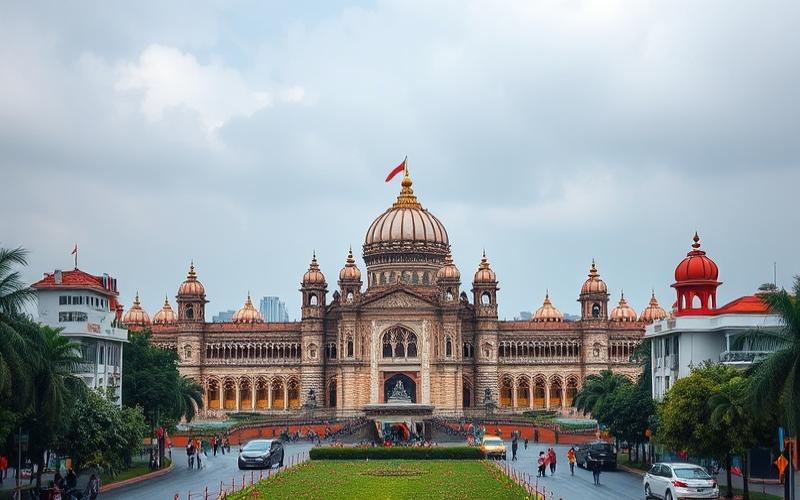
 Published on and written by Cyril Jarnias
Published on and written by Cyril Jarnias
Navigating Indian labor law can prove complex, particularly for expatriates who must contend with a distinct and sometimes confusing legal framework. In this unique context, understanding the protections offered and obligations imposed becomes crucial to avoid potential pitfalls.
Expatriates must pay particular attention to employment contracts, workplace harassment laws, and safety standards, which often differ from those in force in other countries. These elements are particularly important to ensure not only compliance with local laws but also successful and harmonious integration into the Indian market.
Understanding the Legal Framework of Indian Labor Law for Expatriates
Main Laws Governing Labor Law in India
India recently simplified its labor law by consolidating 29 laws into four main codes:
- Wage Code
- Social Security Code
- Industrial Relations Code
- Occupational Health and Safety Code
These codes apply to the majority of workers, including expatriates, with enhanced obligations for the employer and increased fines for non-compliance.
Application to Expatriates
Expatriates working in India must comply with local legislation and are primarily concerned with:
- Obtaining a work visa (Employment Visa) before entry, based on a secured employment contract.
- Strict reporting obligations, particularly for taxation and social security.
Main Legal Protections for Expatriates
| Area | Protection / Regulation |
|---|---|
| Employment Contract | Three main types: fixed-term, indefinite-term, freelance. Most permanent contracts include a probation period (3-6 months) and notice period (3 months). |
| Working Conditions | Application of labor codes: safety, gender equality, prevention of discrimination, union rights. |
| Legal Hours | Workweek varies by sector (generally 48 hours/week), with limits on overtime. |
| Leave | Maternity leave: minimum 26 weeks. Paid leave according to contract and legislation. |
| Health and Safety | Employer’s obligation to ensure a safe environment, including for night work (especially for women). |
| Social Protection | Access to certain social security schemes, under conditions, or via bilateral agreements. |
Legal Obligations of Expatriates in India
- Visa and Work Permit: Submission of an employment contract and employer letter during application. Renewal with the FRRO (Foreigners Regional Registration Office).
- Taxation: Declaration of income in India if the expatriate is a tax resident or receives income from Indian sources. Application of international tax treaties to avoid double taxation.
- Social Security: Some expatriates must contribute to the Indian scheme, unless a bilateral agreement exists.
Concrete Examples
A French engineer recruited by a multinational in Bangalore must present an offer letter and obtain a visa before taking up the position. He will have to declare his income in India and may be subject to the Indian Provident Fund, unless a France-India agreement applies.
A marketing manager expatriated to Mumbai benefits from the same maternity leave as Indian employees (26 weeks), but must check if her contract includes specific clauses for her foreign status.
A non-resident freelance consultant does not benefit from labor code protections and must manage their own insurance and tax procedures.
Practical Tips and Legal Resources
Contact the consular services of your country in India for personalized advice.
Consult a lawyer specialized in Indian or international labor law.
Use the following resources:
- Foreign embassies and consulates in India
- India Visa Application Centres
- Bureau of Immigration (Ministry of Home Affairs)
- Professional expatriate associations
- HR platforms and firms specialized in international mobility
Important
In 2025, Indian legislation strengthened entry requirements for expatriates, favoring certain skilled profiles and imposing strict administrative compliance. Any irregularity can lead to exclusion or expulsion.
Summary of Key Points for Expatriates:
- Obtain a work visa before entry.
- Sign a contract compliant with Indian law.
- Respect local tax and social obligations.
- Verify the protection offered by the contract and bilateral agreements.
- Consult a lawyer or expatriate association for any difficulties.
Good to Know:
Expatriates in India must navigate several key labor laws, such as the Labor Code, employment contract laws, and regulations concerning working conditions. These laws apply to expatriates in the same way as to nationals, offering protections like legal working hours and leave rights, but it is essential to obtain the appropriate work visas to avoid penalties. Expatriates must also fulfill their tax obligations in India, often required even for those paid abroad. For example, an expatriate working for a multinational must often ensure their contract complies with local standards, such as paid leave and the maximum legal working hours per week. Expatriates are advised to consult specialized lawyers or local services such as chambers of commerce for practical advice and to ensure they meet all legal requirements.
Employment Contracts: Legal Obligations and Protections for Expatriates
Legal Obligations of Employers Regarding Expatriates in India
Employers must conclude a written employment contract with expatriates, specifying the job description, compensation, probation period (maximum 6 months), and social benefits.
Hiring an expatriate requires obtaining a work visa (“E” visa), issued for one year or for the duration of the contract (up to 5 years). The salary must generally be above $25,000 per year.
Required documents include:
- Valid passport
- Job offer letter from the Indian employer
- Signed employment contract
- Proof of professional qualifications
- ID photographs
Employers must ensure compliance with Indian taxation: payroll withholding, tax declaration and payment, and adherence to international tax treaties to avoid double taxation.
Registration with local authorities and maintenance of foreign employee records are mandatory.
Protections Offered to Expatriates
Expatriates benefit from protection against wrongful termination: the contract must specify termination terms, and any termination must respect the notice periods and procedures provided by law.
Right to a safe work environment: the employer is required to ensure health, safety, and equal treatment at work.
Rights regarding compensation and leave:
- Payment of agreed salary, bonuses, and benefits according to law
- Access to annual leave, sick leave, and maternity/paternity leave, in accordance with Indian legislation
Applicable Legislative Framework
| Law/Regulation | Application to Expatriates |
|---|---|
| Indian Labor Code (Industrial Disputes Act) | Governs dispute resolution, dismissals, and working conditions for all employees, including foreigners |
| Indian Contracts Act, 1872 | Governs the validity and execution of employment contracts, including for expatriates |
| Shops and Establishments Act | Applies to working conditions (hours, leave, safety), depending on the Indian state |
| Equal Remuneration Act | Guarantees equal pay for men and women, applicable to all employees |
| Income Tax Act, 1961 | Defines taxation applicable to expatriate salaries |
Specific Challenges and Solutions
Administrative Complexity: Difficulty in obtaining work permits and providing required documentation.
Solution: Use local specialized consultants to prepare files and follow procedures.
Double Taxation: Risk of paying taxes in two countries.
Solution: Check for a tax treaty between India and the home country, request a tax residency certificate.
Contractual Disputes: Differences in contract interpretation or working conditions.
Solution: Specify applicable law in the contract, use mediation or arbitration in case of conflict.
Adaptation to Local Framework: Cultural or managerial practice differences that may cause misunderstandings.
Solution: Cross-cultural training and clarification of contractual expectations from hiring.
Concrete Examples
| Situation Encountered | Application of Obligations/Protections |
|---|---|
| An expatriate dismissed without notice | The employee obtained compensation corresponding to the notice period provided in their contract, in accordance with the Indian Labor Code. |
| Non-payment of promised bonuses | The employee filed a claim with the local court, which ordered payment of the due amounts based on the written contract. |
| Difficulty obtaining work visa | The employer used a specialized firm to prepare a compliant file, thus speeding up the permit issuance. |
Key Takeaways
Employers must ensure contractual, tax, and administrative compliance for each expatriate, while employees benefit from legal protection similar to that of local workers, subject to proper contract drafting and compliance with Indian laws.
Good to Know:
In India, employers must ensure that expatriates possess the necessary work permits and comply with local tax requirements, including precise documentation for the work visa, typically the “Employment Visa.” In terms of protections, expatriates benefit from protection against wrongful termination and have the right to a safe work environment, in accordance with the standards of the Indian Labor Code of 2020, which specifically applies to foreign employees. Challenges for expatriates often include cultural and legal differences, and it is advisable to seek help from a lawyer specialized in Indian labor law to navigate these complications. For example, disputes over wages can be effectively resolved through mediation provided by local law, illustrating the importance of understanding available legal remedies.
Paid Leave and Social Protection System for Expatriates in India
Expatriates working in India are entitled, under local law, to a minimum of 12 working days of paid leave per year, with the possibility of accumulation or carryover according to internal company policies and specific state legislations. In some private companies, especially in the tertiary sector, this number can reach 24 days. The precise modalities (prior written request, schedule set in consultation with the employer) vary locally and depend on the individual or collective contract.
| Type of Leave | Average Annual Duration | Main Modalities |
|---|---|---|
| Paid Leave | 12-24 days | According to state/company; prior request |
| Casual Leave | 7 days | Unforeseen absence; limited to 2-3 consecutive days |
| Sick Leave | 12-14 days | Proof required beyond 2 days |
The minimum legal duration is identical for locals and expatriates, with no major specificities for foreign workers. However, some expatriation contracts may provide for more favorable arrangements.
Social Protection for Expatriates in India
For social protection, the Indian system mainly provides:
- A mandatory health insurance since the COVID crisis: covered by the employer for all employees (including expatriates), sometimes extendable to families with an additional contribution.
- General absence of public unemployment benefits.
- A public pension scheme (Employees’ Provident Fund – EPF), to which only certain employees are affiliated based on their contract type and tax status; often not accessible to expatriates except under special conditions.
- Supplementary insurance (life/accident) offered in large companies.
Comparison of Social Coverages
| Social Coverage | Local Employee | Expatriate under Indian Contract |
|---|---|---|
| Health Insurance | Mandatory | Mandatory |
| Unemployment Benefits | Rare/non-existent | Rare/non-existent |
| EPF Pension | Yes | Sometimes / depending on status |
| Life/Accident Insurance | Often optional in private sector | Often optional in private sector |
Practical Tips for Expatriates
The expatriate status affects access to these rights: a seconded employee generally remains affiliated with the social security system of the home country if a bilateral agreement exists. India has signed few international agreements on the portability of social rights; it is therefore recommended to:
- Check if your country has signed a bilateral agreement with India to facilitate the transfer or mutual recognition of contribution periods.
- Explicitly request in your contract a clause specifying the maintenance or supplementary coverage for retirement and provident funds.
- Inform yourself about local private offers (international mutuals, repatriation insurance).
- Anticipate your medical needs: possibly subscribe to a family extension with the provider chosen by your employer.
It is essential that every expatriate precisely verifies their rights before signing the contract: each individual situation largely depends on contractual conventions and the concerned professional sector.
Good to Know:
In India, expatriates are entitled to annual leave set at a minimum of 15 working days per year, similar to that of local workers, but the modalities for taking leave may vary depending on the employer and the employment contract. Regarding the social protection system, expatriates do not automatically benefit from the local system. Local health insurance may require specific arrangements, unemployment benefits are not accessible to non-permanent residents, and it is often recommended to subscribe to international health coverage. As for retirement, expatriates may need to turn to private solutions or bilateral agreements if they exist; this is the case, for example, with some European countries that facilitate the transfer of rights. Expatriates are advised to clarify these aspects during contract negotiation and to check if their home country has agreements with India to avoid unpleasant surprises. Plan to discuss with an expert in international management to ensure optimal coverage and compliance with local legal obligations.
Disclaimer: The information provided on this website is for informational purposes only and does not constitute financial, legal, or professional advice. We encourage you to consult qualified experts before making any investment, real estate, or expatriation decisions. Although we strive to maintain up-to-date and accurate information, we do not guarantee the completeness, accuracy, or timeliness of the proposed content. As investment and expatriation involve risks, we disclaim any liability for potential losses or damages arising from the use of this site. Your use of this site confirms your acceptance of these terms and your understanding of the associated risks.






















































